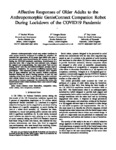Affective Responses of Older Adults to the Anthropomorphic GenieConnect Companion Robot During Lockdown of the COVID19 Pandemic
| dc.contributor.author | Wilson, Rachel | |
| dc.contributor.author | Keane, I | |
| dc.contributor.author | Jones, Ray | |
| dc.date.accessioned | 2022-11-07T12:16:28Z | |
| dc.date.available | 2022-11-07T12:16:28Z | |
| dc.date.issued | 2022-03-07 | |
| dc.identifier.isbn | 9781538685549 | |
| dc.identifier.issn | 2167-2121 | |
| dc.identifier.issn | 2167-2148 | |
| dc.identifier.uri | http://hdl.handle.net/10026.1/19892 | |
| dc.description.abstract |
Anthropomorphic robots may reduce loneliness in older people, however, acceptance is requisite for adoption. We collected the experiences of 10 people aged 80-92 who used a pre-market social robot, GenieConnect, for between 2 to 35 days during the COVID19 pandemic restrictions. GenieConnect is a table-top robot with a large face and animated eyes, designed for support and companionship. The robot asked 'how are you feeling, Name' each day and delivered lifestyle prompts such as medication reminders. We observed conflicting responses from participants - five expressed positive responses, three negative (two of these withdrew) and two neutral. Positive comments included 'feeling not alone'; 'having someone to talk to'; and enjoying being asked 'how are you feeling'. Negative comments were mainly related to not liking the eyes. Design adaptations were made to increase acceptance. We conclude that robots like GenieConnect could reduce loneliness when a user-centred design approach is taken. | |
| dc.format.extent | 1095-1099 | |
| dc.language.iso | en | |
| dc.publisher | IEEE | |
| dc.subject | Human robot interaction | |
| dc.subject | companion robot | |
| dc.subject | senior adults | |
| dc.subject | robot acceptance | |
| dc.subject | loneliness | |
| dc.title | Affective Responses of Older Adults to the Anthropomorphic GenieConnect Companion Robot During Lockdown of the COVID19 Pandemic | |
| dc.type | conference | |
| dc.type | Conference Proceeding | |
| plymouth.author-url | https://www.webofscience.com/api/gateway?GWVersion=2&SrcApp=PARTNER_APP&SrcAuth=LinksAMR&KeyUT=WOS:000869793600166&DestLinkType=FullRecord&DestApp=ALL_WOS&UsrCustomerID=11bb513d99f797142bcfeffcc58ea008 | |
| plymouth.date-start | 2022-03-07 | |
| plymouth.date-finish | 2022-03-10 | |
| plymouth.volume | 2022-March | |
| plymouth.conference-name | 2022 17th ACM/IEEE International Conference on Human-Robot Interaction (HRI) | |
| plymouth.publication-status | Published | |
| plymouth.journal | 2022 17th ACM/IEEE International Conference on Human-Robot Interaction (HRI) | |
| dc.identifier.doi | 10.1109/hri53351.2022.9889480 | |
| plymouth.organisational-group | /Plymouth | |
| plymouth.organisational-group | /Plymouth/Faculty of Health | |
| plymouth.organisational-group | /Plymouth/Faculty of Health/School of Nursing and Midwifery | |
| plymouth.organisational-group | /Plymouth/REF 2021 Researchers by UoA | |
| plymouth.organisational-group | /Plymouth/REF 2021 Researchers by UoA/UoA03 Allied Health Professions, Dentistry, Nursing and Pharmacy | |
| plymouth.organisational-group | /Plymouth/Research Groups | |
| plymouth.organisational-group | /Plymouth/Research Groups/Institute of Health and Community | |
| plymouth.organisational-group | /Plymouth/Users by role | |
| plymouth.organisational-group | /Plymouth/Users by role/Academics | |
| dc.identifier.eissn | 2167-2148 | |
| dc.rights.embargoperiod | Not known | |
| rioxxterms.versionofrecord | 10.1109/hri53351.2022.9889480 | |
| rioxxterms.licenseref.uri | http://www.rioxx.net/licenses/all-rights-reserved | |
| rioxxterms.type | Conference Paper/Proceeding/Abstract |


